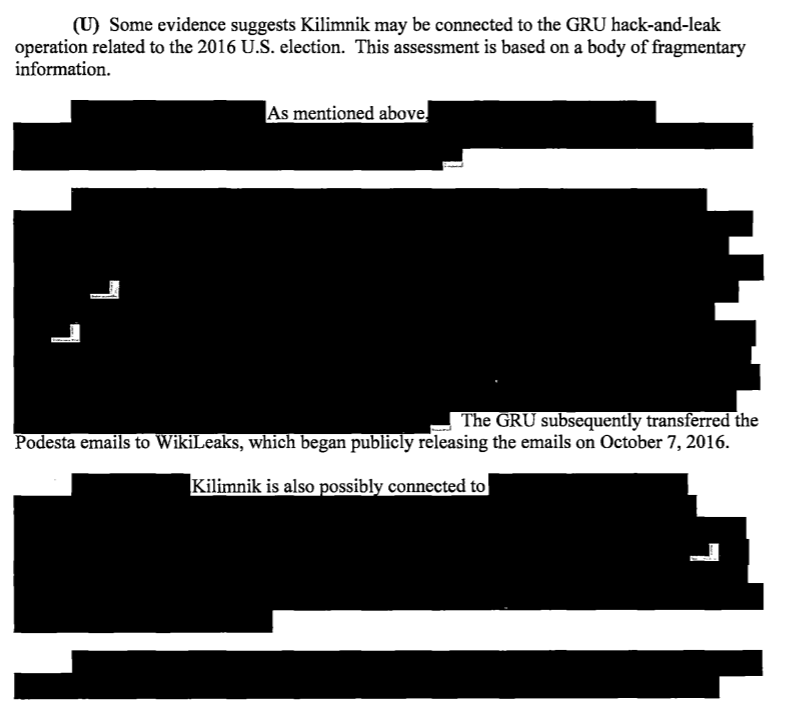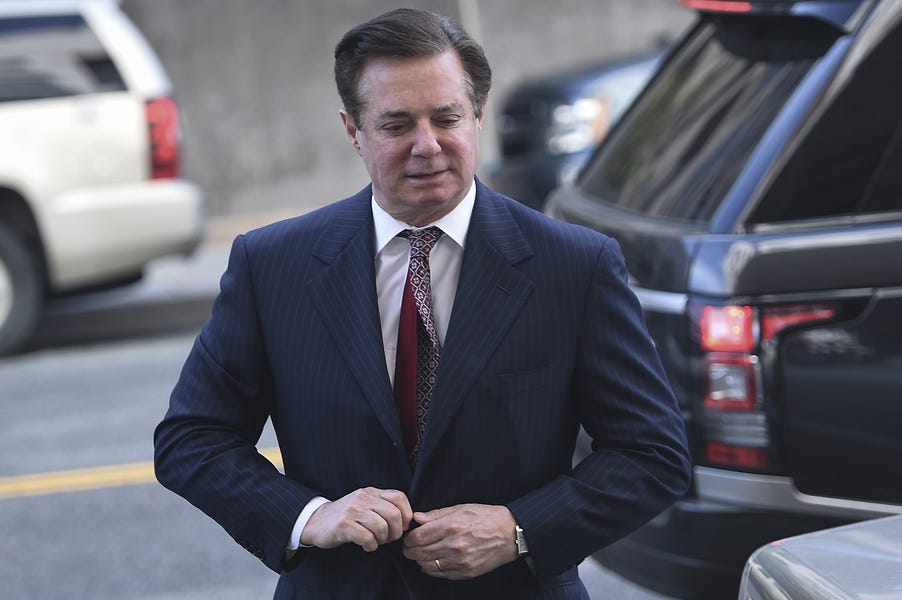Editor’s note: If you received this newsletter twice, we apologize. Due to a production error, this originally was sent out to the Dispatch Fact Check mailing list. Thank you for your understanding.
As the Mueller investigation now recedes into history, I’ve become convinced that public narratives have been dominated by not one, but two Russia hoaxes. The first hoax is summarized in the infamous, malignant Steele Dossier. The document not only contained claims that Russia possessed lurid, compromising information on Donald Trump, it also made the sensational and false allegation that there existed a “well-developed conspiracy of co-operation between [Trump and his associates] and the Russian leadership,” including an “intelligence exchange [that] had been running between them for at least 8 years.”
As I wrote last year, it’s hard to think of a more destructive single document in American political history. The dossier distorted federal law enforcement. It formed part of the Carter Page FISA applications, elements of the dossier made their way to Harry Reid and John McCain, and the president was briefed on its contents.
Moreover, when BuzzFeed made the irresponsible decision to dump the dossier’s unverified contents into the public square, there were two immediate effects:
First, it demonstrated the extent to which an influential media outlet would depart from best practices when it possessed negative allegations against Trump. Second, the instant the claims were published, millions of Americans became convinced they were true… And so we were off to the races. An odd sort of consensus developed on the left and the right. In essence, it was this: The dossier is the scandal.
On the left, millions believed that Mueller would ultimately prove its core claims. On the right, when the dossier became the focus, any lesser contacts or lesser misconduct was treated as no big deal. No conspiracy? No kompromat? No problem.
Since the Mueller Report found no collusion between the Trump campaign and Russia, a second “Russia hoax” has emerged. Even as right-wing politicians and pundits rightly condemned the Steele Dossier and the worst conspiracy theories in the mainstream media, they perpetuated their own hoax—that the Trump campaign never did anything wrong, it never should have been investigated, and the real scandal is FBI and other “deep state” misconduct. Indeed, in this hoax, Trump was nothing more than the innocent victim of an abuse of power “worse than Watergate.”
The contents of the Mueller Report should have debunked this second hoax. After all, it detailed not only a web of improper contacts with Russians but also a web of Trump campaign lies about those contacts. But right-wing Russia hoaxers disregarded the Mueller investigation as a partisan witch hunt. They never truly grappled with the disturbing implications of its disclosures.
Today, however, the Senate Select Committee on Intelligence released a bipartisan report on “Russian active measures campaigns and interference in the 2016 election,” and its core contents—agreed to by Republican and Democratic members of the committee—should bury forever both Russia hoaxes. The most explosive claims of the Steele Dossier are still nonsense, and yet key officials in the Trump campaign (including Trump himself) engaged in conduct that was deeply disturbing, is partially still unexplained, and was worthy of comprehensive investigation.
In its summary of the FBI’s treatment of the Steele Dossier, the report is unsparing. Here’s the most damning paragraph:
Regarding the Steele Dossier, FBI gave Steele’s allegations unjustified credence, based on an incomplete understanding of Steele’s past reporting record. FBI used the Dossier in a FISA application and renewals and advocated for it to be included in the ICA before taking the necessary steps to validate assumptions about Steele’s credibility. Further, FBI did not effectively adjust its approach to Steele’s reporting once one of Steele’s subsources provided information that raised serious concerns about the source descriptions in the Steele Dossier. The Committee further found that Steele’s reporting lacked rigor and transparency about the quality of the sourcing.
“Unjustified credence” could also explain part of the media’s and the public’s response to the dossier, but the media wasn’t the committee’s focus. The bulk of the report is dedicated to explaining the actions of key members of the Trump campaign. And here it breaks some important new ground.
Most notably, it goes into considerable detail describing the close, clandestine relationship between Trump campaign chair Paul Manafort and a Russian named Konstantin Kilimnik. Those who’ve followed the Russia investigation closely recognize Kilimnik’s name and know he had a relationship with Manafort. The Senate panel clearly identifies Kilimnik as a “Russian intelligence officer.”
The report describes how Manafort provided Kilimnik with confidential internal campaign information—including polling data—and engaged in a series of clandestine, coded communications with Kilimnik using encrypted apps and techniques such as “foldering” (creating draft emails and saving them in folders to be read in a joint mailbox rather than sending them from mailbox to mailbox). When Manafort met with Kilimnik in the United States during the campaign, they “departed using separate routes to avoid being seen together.”
Moreover, the committee noted that Manafort lied to the special counsel’s office repeatedly about his contacts with Kilimnick, and these lies had a damaging effect on its own efforts:
Manafort’s obfuscation of the truth surrounding Kilimnik was particularly damaging to the Committee’s investigation because it effectively foreclosed direct insight into a series of interactions and communications which represent the single most direct tie between senior Trump Campaign officials and the Russian intelligence services.
To this day, the Senate still does not fully understand the purpose for sharing the campaign information, nor does it know what Kilimnik did with the information. There was, however, this heavily redacted portion indicating that Kilimnik may have had some connection with the core hack-and-leak effort that disseminated stolen Democratic emails through Wikileaks:

Ultimately, the committee reported that the content of a “majority” of the communications between Manafort and Kilimnik are “unknown.”
Interestingly, the report also indicates that at Kilimnik played a role in planting the idea of Ukrainian interference in the election, an idea that took hold in parts of the far right (and with Trump himself) as an alternative theory to Russian interference:
The report’s discussions of Manafort’s repeated interactions with a Russian intelligence officer are troubling enough, but they’re only a fraction of the campaign’s disturbing contacts and improper actions.
The report states that Wikileaks “actively sought, and played, a key role in the Russian influence campaign and very likely knew it was assisting a Russian intelligence influence effort.” The Trump campaign, however, was eager to reach out to Wikileaks and take advantage of Russia’s hack-and-leak:
Staff on the Trump Campaign sought advance notice about WikiLeaks releases, created messaging strategies to promote and share the materials in anticipation of and following their release, and encouraged further leaks. The Trump Campaign publicly undermined the attribution of the hack-and-leak campaign to Russia and was indifferent to whether it and WikiLeaks were furthering a Russian election interference effort.
The campaign used Roger Stone “to obtain advance information about WikiLeaks’s planned releases,” and the report provides evidence that Trump communicated with Roger Stone regarding Wikileaks:
Note the possibility that Trump deceived the special counsel’s office—though it is notoriously difficult to prove that a person is lying when they claim a memory lapse.
That’s not all. Regarding the infamous June 9, 2016, Trump Tower meeting between Russian lawyer Natalia Veselnitskaya and Donald Trump Jr., Paul Manafort, and Jared Kushner, the committee found evidence that the intent was unmistakable—to receive documents from the Russians to damage Hillary Clinton:
The Committee found evidence suggesting that it was the intent of the Campaign participants in the June 9, 2016 meeting, particularly Donald Trump Jr., to receive derogatory information that would be of benefit to the Campaign from a source known, at least by Trump Jr., to have connections to the Russian government.
The committee also found that two participants in the meeting, Lipnitskaya and Rinat Akhmetshin, have “significant connections to the Russian government, including the Russian intelligence services. The connections the committee uncovered, particularly regarding Veselnitskaya, were far more extensive and concerning than what had been publicly known.”
Again, that’s not all. The committee also provides additional detail about Trump’s attempts to engineer a business deal in Russia, including that Trump’s attorney, Michael Cohen, tried to “leverage” Trump’s positive comments about Putin to advance the attempt to build a Trump Tower in Moscow.
Recall that Cohen lied to Congress about the duration of the efforts to build Trump Tower. He testified that efforts ceased in January 2016 when he knew they continued into June.
The entire report is more than 900 pages, and I haven’t even touched a host of issues it addresses, but the emerging right-wing narrative that the Trump campaign was an innocent victim of Obama administration perfidy is fantastical and farcical. It’s a hoax.
When a campaign chair clandestinely communicates with a Russian intelligence officer, when a campaign tries to obtain opposition research from Russian government sources and Russian intelligence assets, and when a campaign lies about attempts to engineer multimillion dollar business deals in Russia, it has not only crossed every line of propriety, it creates grave counterintelligence vulnerabilities. And we haven’t even discussed the fact that its chief national security consultant, Michael Flynn, had received tens of thousands of dollars from the Kremlin and was serving as an unlawfully undisclosed foreign agent of the government of Turkey during the campaign.
None of this means that the FBI has clean hands. On Friday we learned that former FBI attorney Kevin Clinesmith agreed to plead guilty to altering an email during the FISA application process for Carter Page. Inspector General Michael Horowitz’s report on the Page FISAs and the opening of the Crossfire Hurricane investigation details a host of problems with FBI conduct.
The Clinton campaign bears responsibility for the Steele Dossier, and we can’t forget that U.S. Attorney John Durham hasn’t yet completed his own investigation into the Obama administration’s actions during 2016. More bombs may drop before November.
But we can begin to wind down this dark chapter of American political life roughly confident of four essential truths. First, a thorough investigation of Russian interference and of Trump campaign contacts with Russians wasn’t just proper, it was necessary. Second, while the campaign appears innocent of the worst allegations of misconduct, its actions were dangerous, improper, and raised real counterintelligence concerns. Third, because of evidence of FBI misconduct, the investigation itself must be thoroughly investigated. And fourth, in 2016 political and legal heroes were hard to find.
One last thing…
The NBA playoffs have started, and they’re already great. If you’re like me, you stayed up to watch the Blazers beat the Lakers in Game 1 of their first round series. If not, then you missed Dame Time:
Photograph by Brendan Smialowski/AFP via Getty Images.







Please note that we at The Dispatch hold ourselves, our work, and our commenters to a higher standard than other places on the internet. We welcome comments that foster genuine debate or discussion—including comments critical of us or our work—but responses that include ad hominem attacks on fellow Dispatch members or are intended to stoke fear and anger may be moderated.
You are currently using a limited time guest pass and do not have access to commenting. Consider subscribing to join the conversation.
With your membership, you only have the ability to comment on The Morning Dispatch articles. Consider upgrading to join the conversation everywhere.